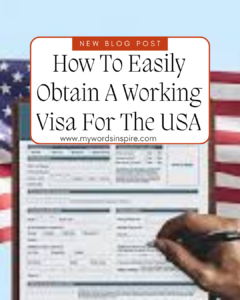
As a highly skilled professional seeking global opportunities, you may wonder how to navigate the complex world of international work visas. Fortunately, several countries offer fully funded visa programs designed to attract top talent like yourself.
These initiatives provide a streamlined path to employment and residency, often with additional perks and support. In this article, you’ll discover some of the most promising fully funded visa opportunities available worldwide.
Whether you’re a tech innovator, a groundbreaking researcher, or a business visionary, these programs could be your gateway to an exciting international career. Read on to explore how you can leverage your expertise to secure a coveted position abroad.

Fully Funded Global Talent Visa Programs Around the World
In today’s interconnected world, countries are increasingly recognizing the value of attracting global talent to bolster their economies and foster innovation. As a result, many nations have implemented fully funded visa programs designed to entice skilled professionals, entrepreneurs, and researchers from around the globe. These initiatives not only provide opportunities for individuals to work and live in new countries but also contribute to the host nation’s growth and development.
1. Innovative Talent Attraction Schemes
Several countries have introduced groundbreaking visa programs to attract top-tier talent. For instance, Canada’s Global Talent Stream offers expedited work permits for highly skilled professionals in specific occupations. Similarly, Australia’s Global Talent Independent Program provides a fast-track pathway to permanent residency for exceptional individuals in targeted sectors.
2. Tech-Focused Visas
With the rapid growth of the technology sector, many nations have tailored their visa programs to attract tech professionals specifically. Estonia’s e-Residency program, while not a traditional visa, allows digital nomads to establish and manage EU-based businesses remotely. Meanwhile, France’s French Tech Visa caters to startup founders, employees, and investors in the tech industry.
3. Research and Academic Opportunities
For those in academia and research fields, countries like Germany offer attractive options. The German Research Foundation provides funding for international researchers, coupled with streamlined visa processes. Likewise, the Netherlands’ Highly Skilled Migrant Program facilitates the entry of qualified researchers and academics.
By offering these fully funded visa programs, countries aim to create diverse, dynamic environments that foster innovation and economic growth. As a global talent, you have unprecedented opportunities to contribute your skills and expertise on an international stage while enjoying the benefits of living and working in a new cultural setting.
Requirements and Eligibility for Fully Funded Visa Opportunities
1. Academic Qualifications
To be considered for fully funded visa opportunities, you’ll typically need to possess outstanding academic credentials. Most programs require a minimum of a bachelor’s degree, with many preferring advanced degrees such as master’s or doctoral qualifications. Your academic performance should be exemplary, often with a GPA of 3.5 or higher on a 4.0 scale. Additionally, standardized test scores like the GRE or GMAT may be necessary, depending on your field of expertise.
2. Professional Experience
While academic achievements are crucial, many fully funded visa programs also value practical experience. You should have a proven track record of excellence in your chosen field, typically with at least 3-5 years of professional experience. Demonstrable leadership skills, innovative contributions, and a history of career progression can significantly enhance your eligibility.
3. Language Proficiency
English language proficiency is often a non-negotiable requirement for these opportunities. You’ll need to demonstrate your linguistic abilities through standardized tests such as TOEFL or IELTS. A score of 100+ on TOEFL or 7.0+ on IELTS is generally expected. Some countries may require proficiency in their native language as well.
4. Research or Project Proposal
Many fully funded visa programs, especially those in academic or research fields, require a well-crafted proposal outlining your intended work or study. Your proposal should be innovative, aligned with the host country’s priorities, and demonstrate potential for significant impact in your field. It’s crucial to articulate how your expertise can contribute to the host country’s development or address specific challenges.
The Application Process Step-By-Step
Navigating the application process for fully funded visa opportunities can seem daunting, but with careful preparation and attention to detail, you can significantly increase your chances of success. Let’s break down the process into manageable steps.
1. Research and Eligibility Check
Before diving into the application, thoroughly research the specific visa program you’re interested in. Each country and program has unique requirements, so it’s crucial to ensure you meet the eligibility criteria. Pay close attention to factors such as age limits, educational qualifications, work experience, and language proficiency requirements.
2. Document Preparation
Once you’ve confirmed your eligibility, start gathering the necessary documents. This typically includes:
- A valid passport
- Educational certificates and transcripts
- Proof of work experience
- Language proficiency test results (e.g., IELTS, TOEFL)
- Financial statements
- Police clearance certificates
Ensure all documents are up-to-date and properly translated if required. It’s advisable to have them certified or notarized as per the program’s guidelines.
3. Application Submission
With your documents in order, it’s time to complete and submit your application. Most programs now offer online application portals, making the process more streamlined. Fill out all forms accurately and thoroughly, double-checking for any errors or omissions. Pay special attention to the personal statement or letter of motivation, as this is your opportunity to stand out and showcase your unique talents and aspirations.
4. Interview and Assessment
Many visa programs include an interview stage. Prepare by researching common interview questions and practicing your responses. Be ready to articulate your goals, explain how you’ll contribute to the host country, and demonstrate your commitment to the program. Some assessments may also include skills tests or medical examinations, so be prepared for these possibilities.
5. Visa Approval and Next Steps
If your application is successful, congratulations! You’ll receive instructions on how to proceed with visa issuance. This may involve submitting your passport to the relevant embassy or consulate. Once you receive your visa, start planning your relocation, including arranging accommodation, travel, and any pre-departure orientations offered by the program.
Remember, the key to a successful application is thorough preparation, attention to detail, and patience throughout the process.
READ ALSO: Top 10 Fully Funded Visa Programs for International Workers
FAQs
What qualifications do I need for a fully funded visa?
Qualifications for fully funded visas vary depending on the specific program and country. Generally, you’ll need to demonstrate exceptional talent or skills in your field. This could include advanced degrees, significant work experience, notable achievements, or unique expertise. Many programs also require proficiency in the host country’s language. It’s crucial to thoroughly research the requirements for each opportunity you’re interested in, as they can differ substantially.
How long does the application process typically take?
The timeline for fully funded visa applications can range from a few months to over a year. Factors affecting processing time include the complexity of the program, the volume of applications received, and the thoroughness of your submitted materials. Some countries offer fast-track options for certain high-demand skills. To improve your chances, start preparing well in advance and ensure all your documentation is complete and accurate.
Can I bring my family with me on a fully funded visa?
Many fully funded visa programs do allow recipients to bring immediate family members. However, policies vary widely between countries and specific visa types. Some may permit spouses and dependent children, while others might have more restrictive rules. It’s essential to clarify family visa options early in your research process. Keep in mind that additional documentation and financial requirements may apply for family members.
What happens after my visa period ends?
Post-visa options depend on the specific program and your circumstances. Some visas offer pathways to permanent residency or citizenship if certain criteria are met. Others may allow extensions or transitions to different visa categories. In some cases, you may be required to return to your home country after the visa expires. It’s crucial to understand these long-term implications before accepting any offer and to plan accordingly throughout your stay.







